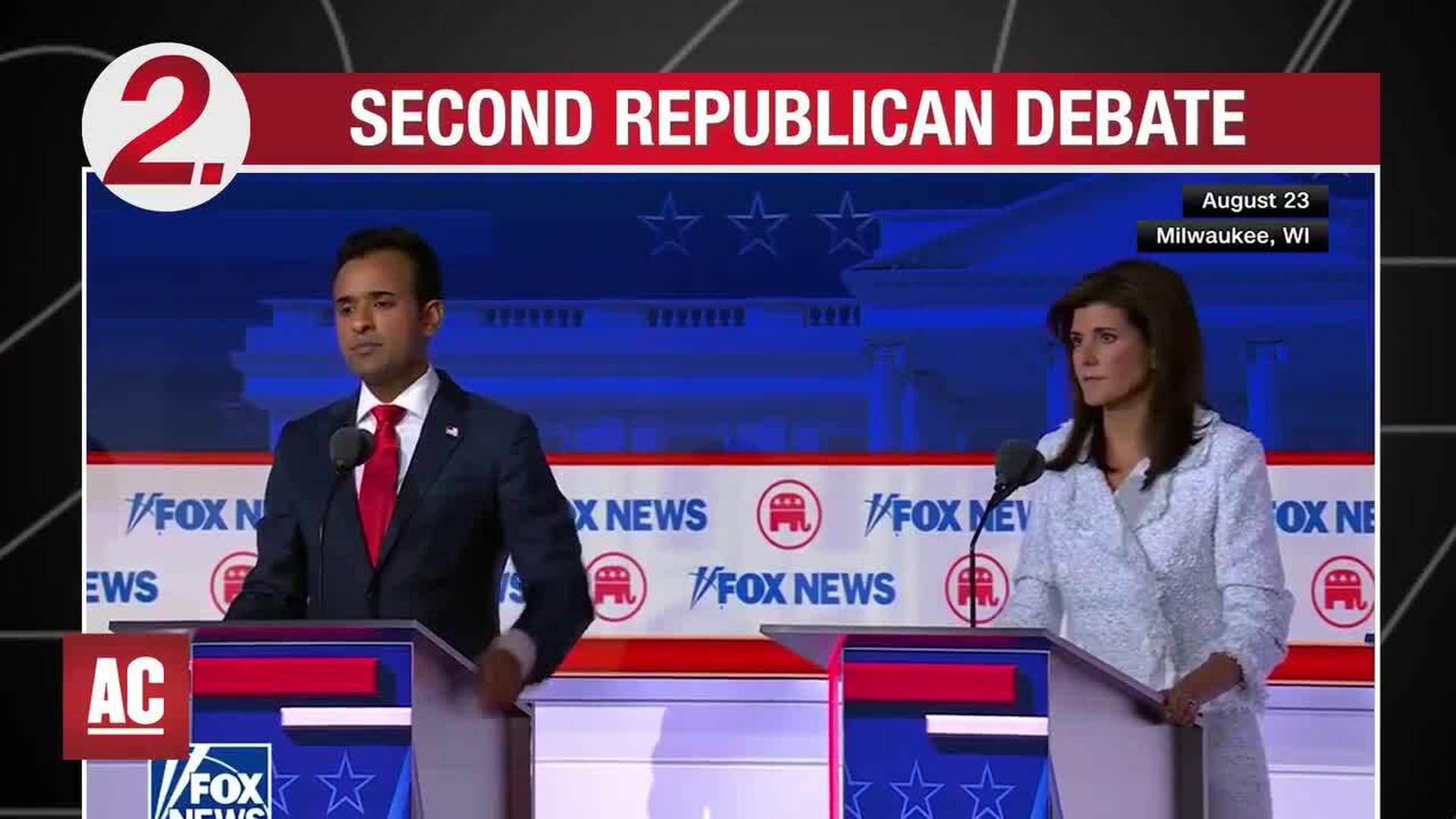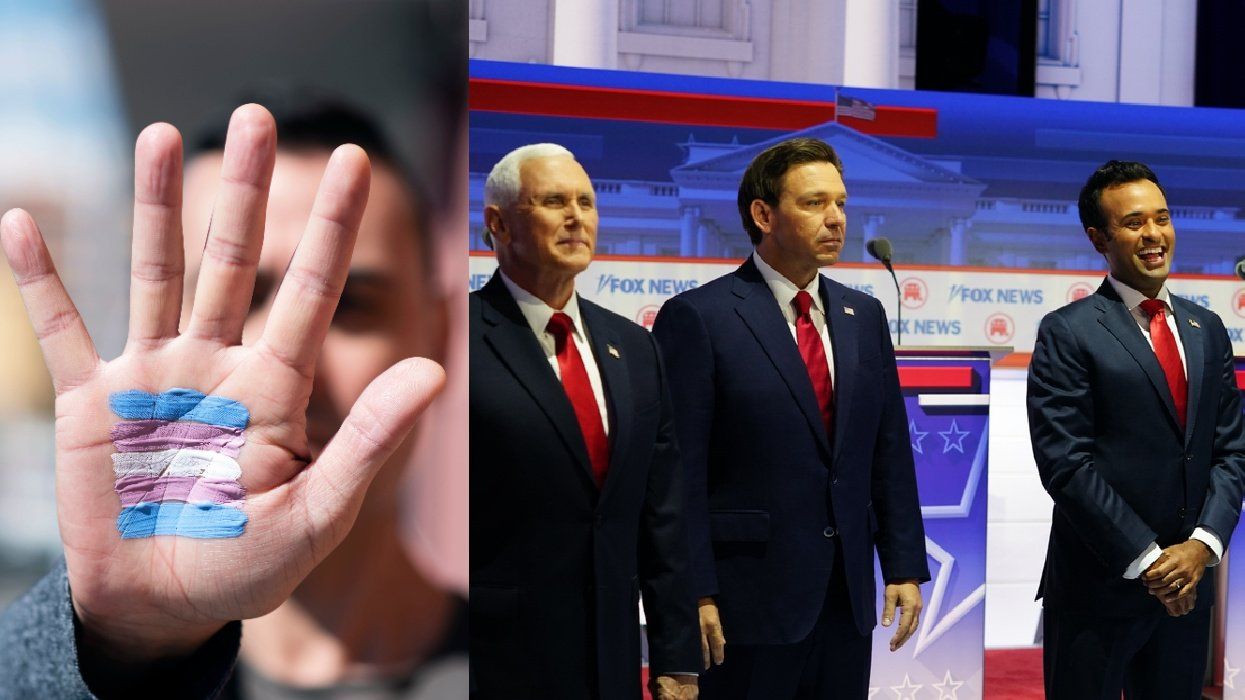The second Republican presidential debate of 2023 was rife with anti-transgender sentiment, with trans people being called mentally ill and promises from candidates to ban gender-affirming health care.
It was also marked by the usual GOP talking points: cut taxes, cut spending, cut regulations, allow school “choice,” ban critical race theory, close the borders, promote fossil fuels, stop abortion, put down teachers’ unions.
The Wednesday night debate was held at the Ronald Reagan Presidential Library in Simi Valley, Calif. Donald Trump, still the front-runner in the polls for the GOP presidential nomination, skipped this debate, as he did the first. The debate was broadcast on the Fox News Channel and Fox Business Network, with Univision anchor Ilia Calderón as moderator.
Transphobia reared its ugly head early in the second hour, in the context of education and parental notification if a student uses a name or pronoun at school that doesn’t match their birth name or gender.
Republican debate drama

Entrepreneur Vivek Ramaswamy quickly said, “Transgenderism, especially in kids, is a mental health disorder. ... It is not compassionate to affirm a kid’s confusion. That is not compassion, that is cruelty.”
Major medical and mental health organizations do not consider transgender identity a mental disorder.
Ramaswamy said lack of parental notification and involvement increases the risk of youth suicide — ignoring the fact that mandatory notification would put young trans people at risk of this or various other bad outcomes if their parents are not supportive.
“I will ban genital mutilation or chemical castration,” he added, noting that he’d met two young women on the campaign trail who regretted undergoing transition procedures. Transition regret is actually very rare, but right-wing activists around the country have been highlighting the experiences of a few over and over again.
Shortly afterward, when Calderón asked former vice president Mike Pence what he’d do about rising anti-LGBTQ+ violence, the former vice president said, “I’ll stand up for the safety and civil liberties of every American of every background,” then pivoted to gender-affirming care.
“We’re going to pass a federal ban on transgender chemical or surgical surgery anywhere in the country,” he said. Like Ramaswamy, he did not say if he meant this just for young people or for adults as well. Genital surgery is almost never performed on minors, and parents or guardians are almost always involved in medical decisions.
“We’ve got to protect our kids from this radical gender ideology agenda,” Pence continued.
Also, as he has done previously, he railed against the Linn-Marr Community School District in Iowa, saying it had a policy that required parental permission for a Tylenol but not a “gender transition plan.”
In truth, the district didn’t offer, by any means, transition plans that included medical procedures, but it merely allowed trans and gender-nonconforming students to use the restrooms and changing rooms of their choice, stated that school staff would respect their identities (including their pronouns), and not disclose their status to parents or guardians without their consent.
The district had to revoke the restroom policy after the state passed a law saying students in public schools had to use the facilities for the gender they were assigned at birth.
Florida Gov. Ron DeSantis, for his part, boasted about his state’s parental rights law, widely dubbed the “don’t say gay or trans” law because it bans instruction on sexual orientation or gender identity in public schools. When asked about student debt forgiveness, he worried aloud that if colleges and universities have more resources, they’ll expand their gender studies departments.
He also claimed falsely that Florida’s standards on teaching African American history say that there was anything positive about slavery. “First of all, that’s a hoax that was perpetrated by Kamala Harris,” he said. “Second of all, that was written by descendants of slaves.”
However, the standards include this sentence, which was criticized by Vice President Harris: “Slaves developed skills which, in some instances, could be applied for their personal benefit.” What’s more, as The New York Times notes in its fact-check of the debate, there were some Black members on the task force that developed the standards, but some Black history scholars have denounced the standards and said “they were sidelined from the process of drafting them in favor of political appointees.”
U.S. Sen. Tim Scott of South Carolina, the debate’s only Black participant, did say there were no redeeming qualities to slavery, but he claimed it was harder for African Americans to recover from President Lyndon Johnson’s Great Society programs — designed to lift all Americans out of poverty — than from slavery and post-slavery discrimination.
The debate was marked by the usual rhetoric against abortion rights and assertions that Democrats would allow abortion until the moment of birth, which is not true. DeSantis distanced himself a bit from Trump, who recently criticized the Florida governor for signing a bill into law that banned abortion after six weeks of pregnancy, and DeSantis critiqued the former president right back. He further denied that abortion is a losing issue for his party, saying, “I reject this idea that pro-lifers are to blame for midterm defeats.”
Chris Christie bragged of denying funding to Planned Parenthood — which provides contraception and many other health care services in addition to abortion — when he was governor of New Jersey. Pence said he “will build bridges to every community in this country,” and “it begins with the unborn."
There were many calls for stopping undocumented immigrants from coming into the U.S., even though Reagan, as the moderators pointed out, granted amnesty to millions when he was president. Ramaswamy even urged an end to birthright citizenship for children born in the U.S. to undocumented immigrants.
There was also the demonization of teachers’ unions, with Christie saying the unions are running public schools, not the public, and saying the unions have an ally in the White House because President Biden is “sleeping with a member of the teachers’ union.” First Lady Jill Biden teaches in a community college and is a member of the National Education Association. Pence later noted that his wife is a teacher too, although not a union member.
The solution most offered to problems facing education is school choice, which generally means offering parents public funds to pay tuition at private schools. Haley said schools need to quit focusing on diversity, equity, and inclusion programs and critical race theory — the latter is not taught outside of higher education — and DeSantis said the problem of schools is that they’re indoctrinating students.
The candidates frequently talked over and interrupted each other, and in addition to DeSantis, there were some willing to criticize Trump for his absence. Ramaswamy called Trump “an excellent president” but said his “America first” agenda wasn’t limited to one man. But when moderators asked which candidate each participant would “vote off the island,” Christie said, “I’d vote Donald Trump off the island right now.” This came even though Christie supported Trump in 2016.
Christie got off another line against Trump earlier in the evening, criticizing him for not joining in the debate. “You’re not here tonight,” Christie said. “Not because of polls, and not because of your indictments. You’re not here tonight, because you’re afraid of being on the stage and defending your record. You’re ducking these things. And let me tell you what’s going to happen if you keep doing that. No one up here is going to call you Donald Trump anymore. We’re going to call you Donald Duck.”
That was about the only reference in the debate to the many indictments Trump is facing for possession of classified documents and efforts to reverse the results of the 2020 election. Nor was there a reference to a New York judge’s recent finding that Trump had committed fraud in running his businesses.

















































